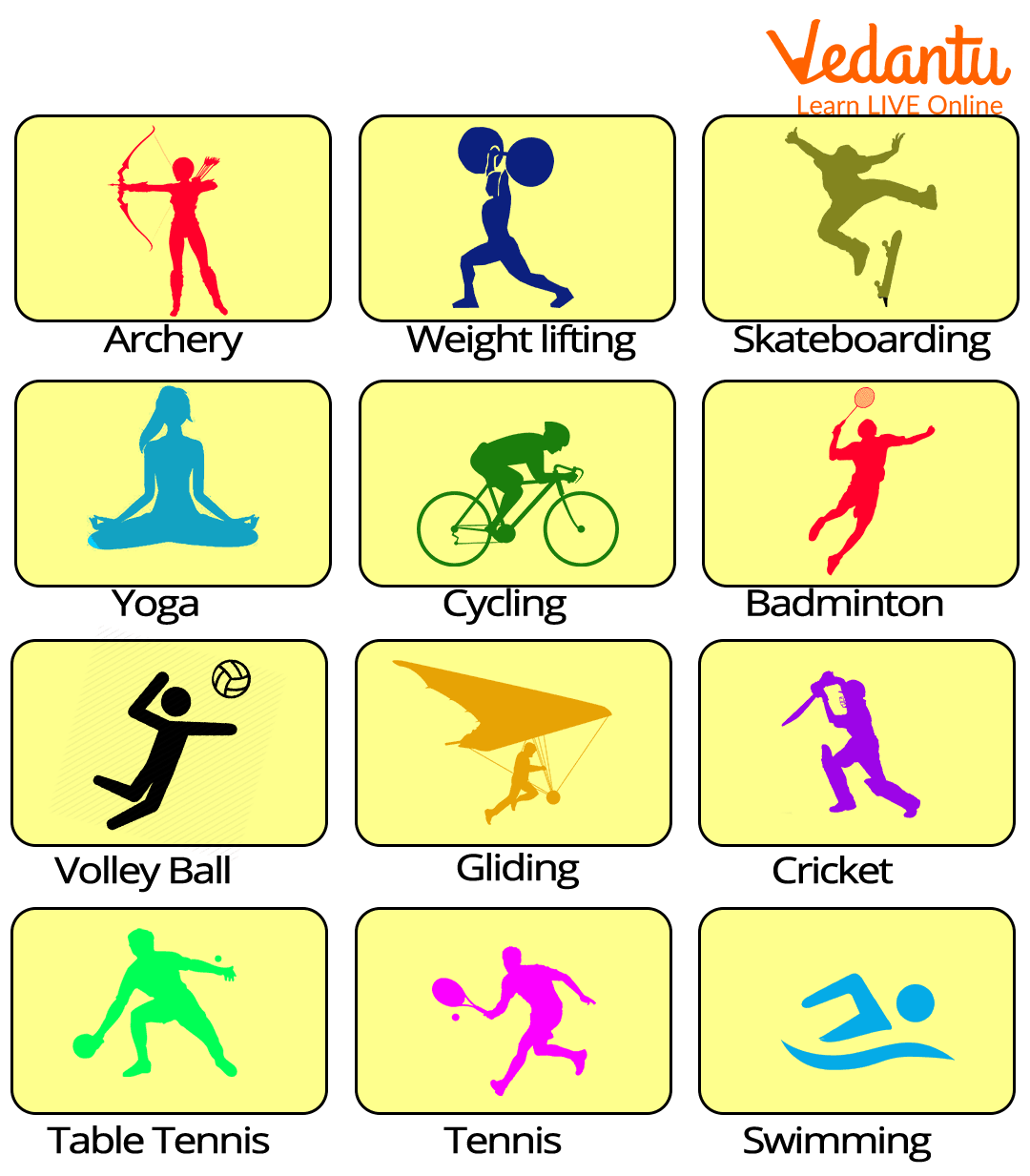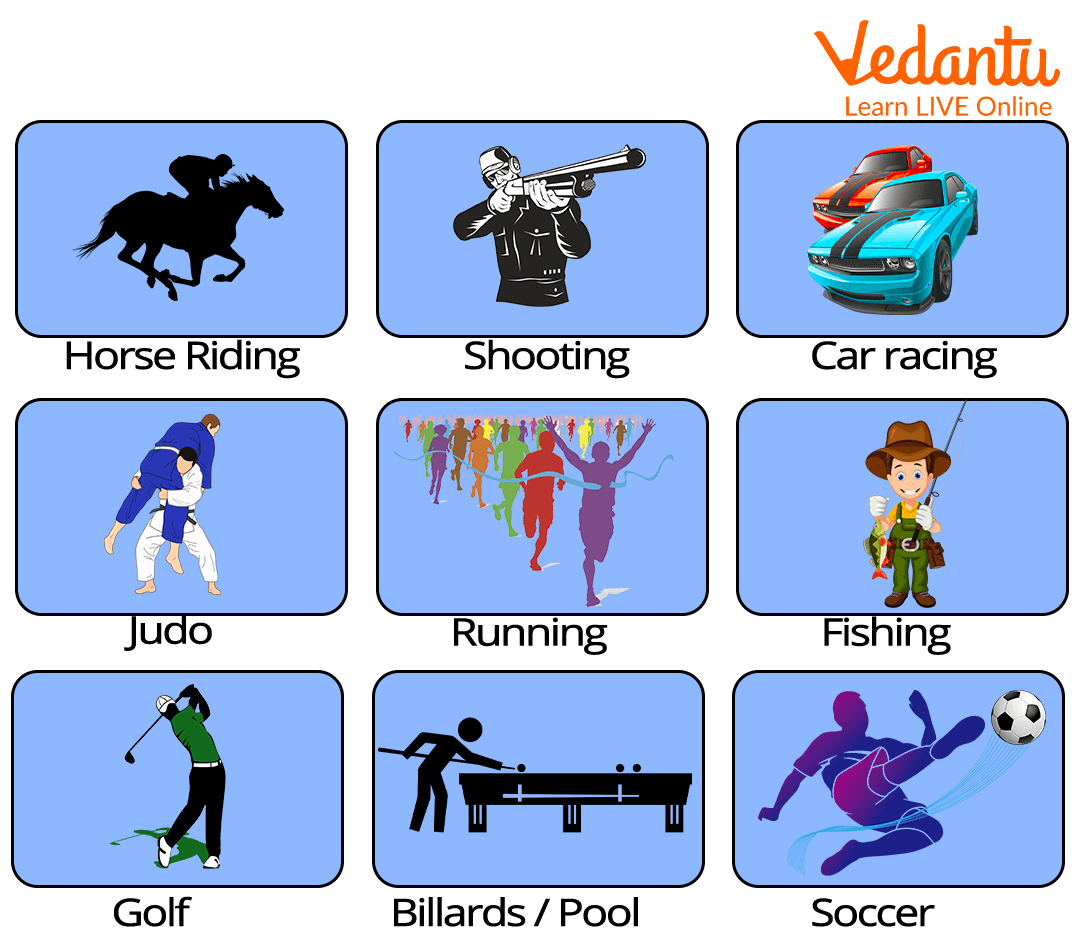




How English Games Make Learning Fun and Effective for Students
Are you a sports enthusiast? Do you love playing games with your friends and family? Have you watched the Olympic Games? There are a variety of sports events held in the Olympics. If you’ve ever wondered about these games or wish to know their names, we are here to enlighten you. We have prepared a list of some English game names with pictures and examples, some of which you can play with your friends.
Playing sports is important for a healthy life. It helps us relieve stress and makes us healthy and energetic. Other than having fun with friends and playmates, one can also learn about the values of discipline, teamwork, unity, and hard work through sports. This list of English game names will not only make your game time exciting and fun but also strengthen your speaking and listening abilities as you add new words to your vocabulary.

A collection of different sports
Types of Sports or Games
The definition of games states, 'a physical or mental competition conducted according to rules with the participants in direct opposition to each other'.
Let’s classify the different types of games based on the use of primary equipment or the setting of the game.
Air Sports: As the name suggests, these sports activities are usually conducted in the air or above the ground. Eg: Drone racing, paragliding, skydiving, etc.
Athletics: This category comprises all gaming events involving competitive running, jumping, throwing, and walking. Eg: sprints, hurdles, relays, jumps (high jump, long jump, triple jump, pole vault), throws (shot put, javelin, discus throw, hammer), etc.
Ball Sports: You might have guessed already, ball sports include all games involving a ball. Eg: cricket, football, hockey, volleyball, tennis, baseball, rugby, etc.
Board Sports: These games require a board or board-like object as the primary equipment. Eg: skateboarding and surfing among others.
Combat Sports: Combat sports or fighting sports are competitive games involving contact between the opponents and a one-on-one fight. Eg: martial arts, boxing, kickboxing, karate, taekwondo, etc.
Cycling Sports: As obvious, cycle sports include races involving bicycles or can also be a display of tricks and skills on a bicycle.
Gymnastics: This category of sports involves performing systematic exercises while exhibiting balance, strength, flexibility, coordination, and overall physical conditioning, with the help of rings, beams, or bars.
Ice Sports: Commonly held during winters, these games are usually played on ice. Eg: ice hockey, ringette, broomball, speed skating, curling, skiing, etc.
Indoor Games: These games are specially designed to be played indoors, within the four walls of an auditorium-like area, or at home. Eg: table tennis, chess, indoor soccer and cricket, billiards, etc.
Mind Sports: Mind sports require a high level of concentration and fine intellectual ability. The player should have the acumen to strategize their moves in order to win the competition. Eg: chess, sudoku, checkers, etc.
Motorsports: This category of sports competitions requires motorised vehicles that compete in racing events. Eg: car racing, motorcycle racing, oval track racing, etc.
Racket Sports: Racket sports require the player to hit a ball or an object such as a shuttlecock with a racket in an outdoor set-up. A net is usually displayed to demarcate the areas of the opponents. Eg: badminton, lawn tennis, squash.
Strength Sports: These sporting activities test the muscular strength and endurance of the player. Eg: weightlifting, powerlifting, and bodybuilding.
Target Sports: These games necessitate a high level of focus and concentration. The player participating in these events throws or shoots a piece of equipment to hit a target. Eg: air rifle shooting, archery, bowling, golf, billiards, darts, etc.
Water Sports: As the name suggests, all sports events that are performed or played in waterfall fall under the category of water sports. Eg: surfing, swimming, diving, rowing, rafting, water polo, etc.
List of English Game Names
In alphabetical order, here is a list of some popular sports.
Acrobatics
Aerobic Gymnastics
Archery
Arnis
Artistic Gymnastics
Artistic Swimming
Badminton
Baseball
Basketball
Baton Twirling
Bicycle Motocross (BMX)
Billiards/ Pool (U.S.)
Bobsleigh
Bodybuilding
Bowling
Boxing
Canoeing
Car Racing
Cheerleading
Chess
Cricket
Croquet
Curling
Dance Sport
Darts
Diving
Dodgeball
Fencing
Figure Skating
Football (U.K)/ Soccer (U.S., Australia)
Frisbee
Golf
Handball
Hang Gliding
Hockey
Horseback Riding
Horse Racing
Ice Hockey
Ice Skating
Jet Ski Racing
Judo
Karate
Kayaking
Kendo
Kickboxing
Kite Surfing
Lacrosse
Luge
Mixed Martial Arts
Motocross
Muay Thai
Paintball
Parachuting
Paragliding
Parkour
Polo
Pool/Billiards
Powerlifting
Rafting
Rhythmic Gymnastics
Rock Climbing
Rowing
Rugby
Sailing
Sandboarding
Scuba Diving
Shooting
Skateboarding
Skeleton
Skiing
Snowboarding
Softball
Speed Skating
Sport Climbing
Squash
Sumo Wrestling
Surfing
Swimming
Synchronised Skating
Synchronised Swimming
Table Tennis
Taekwondo
Tennis
Track and Field
Trampolining
Triathlon (Tetrathlon, etc.)
Tug of War
Volleyball
Water Polo
Weightlifting
Windsurfing
Wrestling
Wu Shu

Some of the English game names

Some more English game names
Conclusion
So, we hope you have learned something new and interesting today. Make a list of the games you would like to play with your friends or siblings. Also, you can do some research on your own and find out more information about the different national and international sports competitions, such as the Asian Games, Olympics, Commonwealth Games, FIFA, Cricket World Cup, etc.
FAQs on Best Popular English Game Names for Kids to Learn Fast
1. What are some simple and popular English games for young kids to learn fast?
Some of the most popular and effective English games for young children are simple and require minimal setup. Good examples include I Spy, where kids identify objects based on their starting letter, improving observation and vocabulary. Another is Simon Says, which enhances listening skills and vocabulary related to actions. Word Chain is also excellent for building vocabulary, where each player says a word that starts with the last letter of the previous word.
2. How do naming games like 'Name 5 Things' help in a child's English language development?
Naming games like 'Name 5 Things' are highly beneficial as they target several key cognitive skills. They encourage rapid vocabulary recall by challenging a child to quickly access words within a specific category (e.g., 'Name 5 fruits'). This activity also improves categorisation skills, helping children understand relationships between different objects and concepts. Finally, it builds confidence in speaking and quick thinking under a fun, low-pressure setting.
3. What are some examples of interactive English games that improve speaking skills?
Interactive games that encourage active participation are excellent for developing speaking skills. Key examples include:
Charades: Kids act out a word without speaking, while others guess. This builds a strong connection between actions and vocabulary.
Role-Playing: Children can pretend to be characters in a shop or a restaurant, practising real-world conversations and sentence structures.
Show and Tell: A classic game where a child brings an object and describes it to others, which helps develop descriptive language and public speaking confidence.
4. Why are games with repetition, such as tongue twisters, so effective for kids learning English?
Repetitive games are effective because they tap into how a child's brain naturally learns language. Repetition helps to strengthen neural pathways, making it easier to remember new words and sounds. Tongue twisters, specifically, are great for improving pronunciation and articulation by exercising the mouth muscles needed for specific sounds. This repeated practice builds phonetic awareness and fluency, making speech clearer and more confident over time.
5. How can parents create simple English learning games using everyday objects at home?
Parents can easily turn their home into a language-learning playground. For instance, a 'Home Scavenger Hunt' can have kids find objects based on descriptions (e.g., 'Find something soft and blue'). You can also use sticky notes to play 'Label the Room', where you write the names of objects like 'chair', 'table', and 'window' and have your child match the label to the object. This directly connects the written word to the physical object, reinforcing vocabulary in a practical context.
6. What is the main difference between a game that teaches vocabulary and one that teaches grammar?
The primary difference lies in their focus. Vocabulary games (like Pictionary, Crosswords, or 'I Spy') are designed to teach the meaning and spelling of individual words. Their goal is to expand a child's lexicon. In contrast, grammar games (like Mad Libs or Sentence Scrambles) focus on how words work together. They teach sentence structure, verb tenses, prepositions, and the rules that govern a language, helping kids form correct and meaningful sentences.
7. Are digital English learning apps as beneficial as physical, interactive games for kids?
Both digital apps and physical games offer unique benefits and are most effective when used in combination. Digital games often provide structured learning, instant feedback, and are excellent for practising spelling and phonics. However, physical, interactive games like Charades or role-playing are superior for developing crucial social skills, spontaneous conversation, and creative thinking. A balanced approach that includes both types of games ensures a well-rounded development of English skills.















